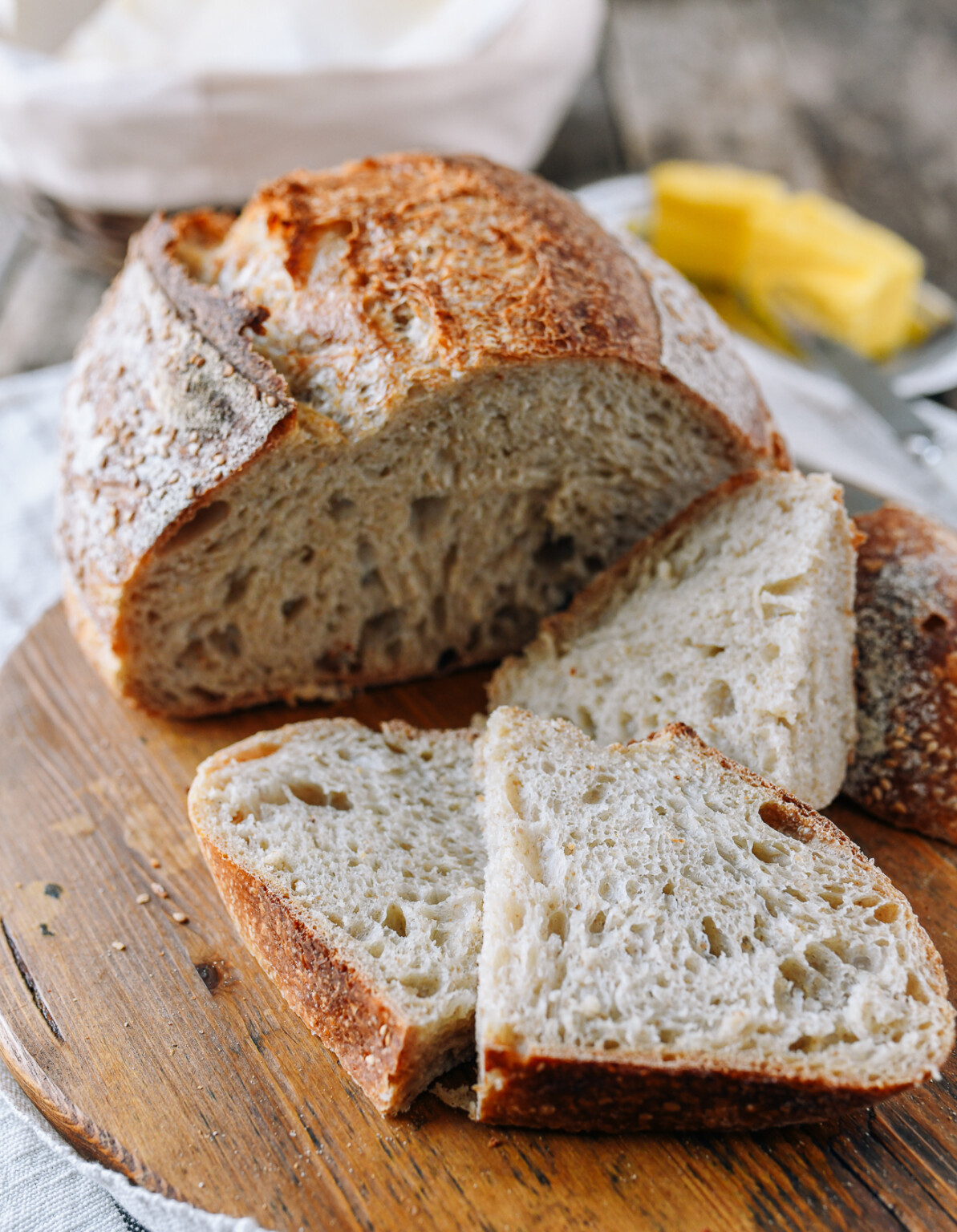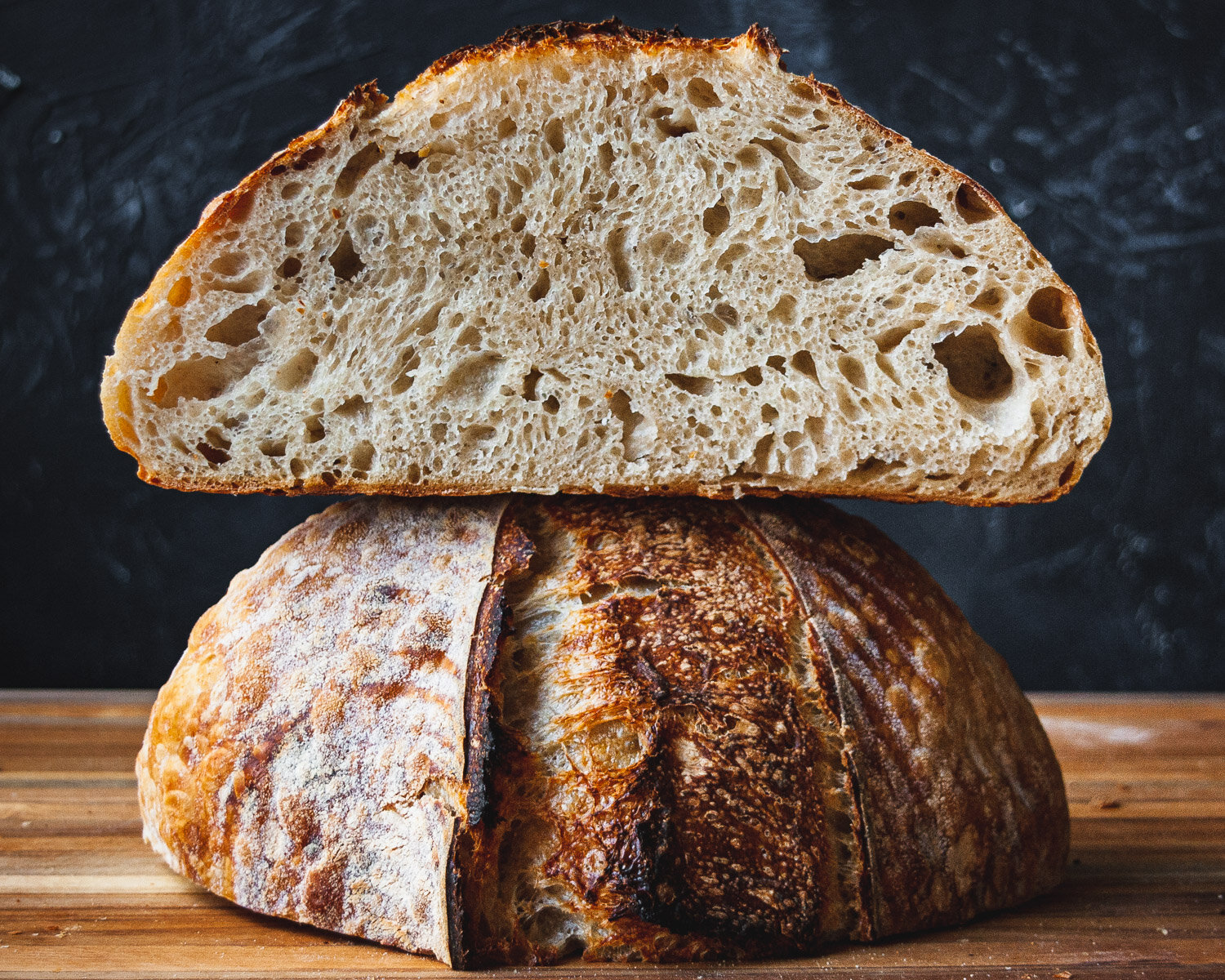Have you noticed your sourdough starter giving off a scent that reminds you of nail polish remover? It can be a bit alarming, can't it? That strong, sharp smell of acetone might make you wonder if something has gone wrong with your beloved starter, or if it's still good for making those wonderful, tangy loaves of bread. You are certainly not alone if you've come across this particular aroma; it's a common experience for many home bakers who keep a sourdough starter alive.
Figuring out what the various aromas and odors in your sourdough starter mean is a big part of keeping it healthy and happy. A healthy starter usually has a pleasant, mild sour smell, a bit like yogurt or buttermilk, which shows that the good bacteria are busy doing their work. But when that distinct acetone smell shows up, it's a sign your starter is trying to tell you something rather important. This particular scent, which can be quite strong, is actually a byproduct of the fermentation process, so it's not always a bad sign, you know?
This article will help you understand why your sourdough starter might smell like acetone, what that smell really means for your baking, and most importantly, how to get your starter back to smelling its best. We'll look at the causes, the ways to fix it, and some tips for keeping your starter balanced and ready for baking. It’s all about listening to what your starter communicates through its scent, and then taking the right steps to help it thrive.
Table of Contents
- What's That Smell? Decoding Your Starter's Scent
- Why the Acetone Aroma Appears: Common Reasons
- Feeding Your Starter Right: The Key to Balance
- Temperature and Its Impact on Starter Health
- Troubleshooting Other Issues: Beyond Just Feeding
- Frequently Asked Questions About Acetone Smells
- Getting Your Starter Back on Track
What's That Smell? Decoding Your Starter's Scent
Every sourdough starter has its own unique smell, kind of like a personality. Learning to understand these scents is a really important skill for any baker. It helps you know if your starter is happy and ready to bake, or if it needs a little bit of help. A healthy starter will give you certain clues through its aroma, while a stressed one might smell quite different.
Healthy Starter Smells
When your starter is thriving, it will have a mild sour smell. This scent can be compared to yogurt or buttermilk, which is a good sign that the lactic acid bacteria are actively fermenting the flour and water. It might also smell pleasantly yeasty, a bit like fresh bread dough. This is exactly what you want to experience, as it means your starter is balanced and active. So, if you get this kind of smell, you're on the right track, you know?
What Acetone Smell Means
If your sourdough starter has started to smell like acetone, or nail polish remover, you might be wondering if it’s still safe to use. This aroma is a byproduct of fermentation, specifically the alcohol produced by the yeast. When your starter is running low on food, the yeast might start producing more alcohol, which then breaks down into compounds that smell like acetone. It's a normal sign that it’s hungry and needs feeding. However, contrary to what some people think, the acetone odor does not always mean "your starter is hungry." It can occur at any stage of the feeding cycle, and it is often persistent even when the starter is fed. This smell can also indicate that the starter is too acidic. Basically, it’s a strong signal from your starter that something in its environment or feeding schedule needs a little adjustment.
Why the Acetone Aroma Appears: Common Reasons
The acetone smell in a sourdough starter can be caused by various factors, such as temperature, moisture, and acidity. It’s a sign of hunger and fermentation, but it’s not always straightforward. Understanding these causes helps you figure out the best way to help your starter feel better. There are, in fact, quite a few things that can lead to this particular smell, so it's good to look at them all, you know?
A Sign of Hunger
One of the most common reasons for an acetone smell is that your starter is very hungry. In a mature starter, this smell often indicates that the starter is running out of food (flour) and needs to be fed more often, or with a different ratio of flour and water. When the yeast runs out of sugars to consume, it starts breaking down other components, producing alcohol. This alcohol can then turn into compounds that give off that distinct acetone scent. So, if you notice this smell, it's often a good idea to think about when you last fed it, or if it needs more food, you know?
Temperature's Big Impact
The temperature where you keep your starter plays a really big role in its activity and the smells it produces. If your starter is kept in a warmer spot, it will ferment faster and get hungry more quickly. This faster activity can lead to it running out of food sooner, which in turn can cause the acetone smell. On the other hand, a cooler temperature might slow down fermentation, but if it's too cool and not fed enough, it can also lead to imbalances. So, finding that sweet spot for temperature is pretty important for keeping things balanced, you know?
Acidity Levels
An acetone smell can also mean your starter is too acidic. Acetic acid contributes to sourdough’s characteristic tang, but too much of it can create an imbalance. When the starter becomes overly acidic, it can stress the yeast and bacteria, leading to the production of different byproducts, including those that smell like acetone. This can happen if you don't feed it enough, or if you don't discard enough of the old starter before feeding. It’s all about maintaining a good balance of the tiny living things inside, you know?
The Hooch Connection
Sometimes, you might see a dark liquid on top of your starter. This is called "hooch," and it's a sign that your starter is hungry. As this hooch is primarily alcohol, it often smells like nail polish remover or acetone. While hooch itself isn't necessarily a bad sign, a strong acetone smell accompanying it means your starter is really craving some food. You can just stir the hooch back in or pour it off before feeding, depending on your preference. But, you know, it's definitely a clue that your starter is in need of some attention.
Feeding Your Starter Right: The Key to Balance
Feeding your sourdough starter properly is probably the most important thing you can do to prevent and fix that acetone smell. It's all about giving your starter the right amount of food at the right time. This helps maintain a good balance of the yeast and bacteria that make your sourdough so special. So, getting this part down is pretty crucial, you know?
How Often to Feed
If your starter has an acetone smell, it usually means it’s too acidic or hungry. A good first step is to discard half of the starter, then feed it with equal parts water and flour. For example, if you have 50 grams of starter left after discarding, add 50 grams of water and 50 grams of flour. You might need to feed it more often than you currently are. If it’s smelling like acetone soon after a feed, it could mean it’s eating through its food too quickly, perhaps because it's too warm, or you're not giving it enough food for its activity level. A mature starter with an acetone smell often indicates it needs to be fed more often, or kept at a lower ambient temperature to slow its metabolism. This is, like, a really important part of keeping it happy, you know?
Flour Type Matters
The type of flour you use can also affect your starter’s smell and activity. Different flours have different nutrient levels, and some might be consumed faster than others. Using a mix of flours, or trying a different kind, might help balance your starter. For instance, whole wheat flour has more nutrients than white all-purpose flour, so a starter fed with whole wheat might stay active longer, or might need more water. Experimenting a little with your flour choice could be helpful, you know?
Getting Hydration Right
The ratio of water to flour, or hydration, also plays a role. A thicker starter might ferment differently than a thinner one. If your starter is very thick, it might be harder for the yeast and bacteria to move around and access the food, which could lead to imbalances. Making sure your starter is well-hydrated, but not too watery, helps the fermentation process go smoothly. It's all about finding that right consistency, you know?
Temperature and Its Impact on Starter Health
Temperature is a big player in the overall health and smell of your sourdough starter. It directly affects how fast the microbes in your starter work. If your kitchen is warm, your starter will be more active and use up its food more quickly, possibly leading to that acetone smell if it gets too hungry between feedings. This is why some people keep their starters in cooler spots, like a pantry or even the fridge, to slow down its metabolism when they aren't baking often. A user, for instance, asked for help with a starter that smelled of acetone despite frequent feedings, and other users suggested temperature as a possible cause. So, adjusting where you keep your starter can really make a difference, you know? Keeping it in a slightly cooler place might just be the trick to prevent it from getting too hungry too fast.
Troubleshooting Other Issues: Beyond Just Feeding
While feeding is often the main solution, sometimes other factors can contribute to an acetone smell. It's good to consider all possibilities when your starter is giving off an unpleasant aroma. Even with all these issues, enough life may still remain in your sourdough starter to bring it back to its happy self. So, don't give up on it just yet, you know?
Keeping the Jar Clean
A clean environment is important for your starter. Over time, dried bits of starter can build up on the sides of the jar, which can harbor unwanted microbes or just make it harder to tell what's going on with your starter. Learning when and how to clean your sourdough starter jar can prevent mold and keep your starter healthy with easy tips and care routines. A clean jar helps you see the true activity and smell of your starter without any old, crusty bits interfering. It's a simple step, but it really helps, you know?
When the Smell Stays
If you've been working on your first sourdough starter for a while, say almost two weeks, and things were going well initially, but it's been smelling like acetone since, you might need to try a few things. A user shared their experience of a starter that smelled like acetone and asked for help, and other users replied with suggestions and tips. If the smell is persistent even with frequent feedings, it might be a sign that your starter is too acidic, or perhaps the feeding ratio needs to be adjusted significantly. Sometimes, a very small inoculation (less starter to more new flour and water) can help reset the balance. It’s like giving it a fresh start, in a way, you know?
Frequently Asked Questions About Acetone Smells
Here are some common questions people ask when their sourdough starter smells like acetone:
Is an acetone smell in sourdough starter normal?
Yes, it can be a normal sign that your starter is hungry or that the yeast is producing alcohol as a byproduct of fermentation. It's a common aroma, especially when the starter needs food. So, you know, it's not usually something to panic about right away.
What causes an acetone smell in sourdough starter?
The acetone smell is often caused by the starter being hungry, meaning it has run out of food. It can also be influenced by temperature, leading to faster fermentation, or by the starter becoming too acidic. The presence of hooch, which is mostly alcohol, also contributes to this smell. There are lots of things that can lead to it, actually.
How do I get rid of the acetone smell in my sourdough starter?
To get rid of the acetone smell, try feeding your starter more frequently or with a larger amount of flour. Discarding a good portion of the starter before feeding can also help. Adjusting the temperature to a slightly cooler spot can slow down fermentation, and ensuring proper hydration is also important. These steps help balance the microbes and reduce the acetone aroma. Learn more about sourdough on our site for more detailed feeding schedules, you know.
Getting Your Starter Back on Track
Discovering the reasons behind why your sourdough starter has an acetone smell is a big step towards fixing it. This comprehensive exploration of "my sourdough starter smells like acetone" has unveiled the intricate relationship between starter maintenance, microbial balance, and the aromas it produces. If your sourdough starter has an acetone smell, it usually means it’s too acidic or hungry. Start by discarding half of the starter, then feed it with equal parts water and flour. Learn why your sourdough starter may smell like acetone, cheese, alcohol, or vomit, and how to fix it. Find out what your starter should smell like, how to feed it, and how to avoid these issues. Remember, even with these smells, enough life may still remain in your sourdough starter to bring it back. You can find more general baking advice at a reputable baking resource. Keep trying different approaches until your starter smells pleasantly yeasty again, with that mild, characteristic tang. This page also has helpful tips for troubleshooting common sourdough problems. Happy baking!
- How Walking Dead Will End
- January 29 Zodiac Sign
- Litty Britty
- Kilowatt San Francisco
- Chris Hemsworth Body



Author Details:
- Name : Dr. Rosemarie Tromp DVM
- Username : vkuhn
- Email : selina40@jakubowski.com
- Birthdate : 2004-01-28
- Address : 475 Sarah Ramp Suite 877 West Wilfridtown, RI 26042
- Phone : +1 (646) 606-3116
- Company : Abshire, White and Armstrong
- Job : Sound Engineering Technician
- Bio : Eligendi sapiente praesentium doloribus cum in sapiente nobis aliquam. Saepe id optio nobis numquam tenetur aliquam sunt. Dolorem et sapiente est et rerum neque. Illo nesciunt odit animi possimus.
Social Networks
Facebook:
- Url : https://facebook.com/charity_maggio
- Username : charity_maggio
- Bio : Cum aut et corrupti repudiandae iusto possimus.
- Followers : 3348
- Following : 1112
Tiktok:
- Url : https://tiktok.com/@maggioc
- Username : maggioc
- Bio : Optio dolor quis voluptatem nesciunt.
- Followers : 3566
- Following : 2408
Linkedin:
- Url : https://linkedin.com/in/charity.maggio
- Username : charity.maggio
- Bio : Aspernatur maiores pariatur beatae sed aut odio.
- Followers : 3720
- Following : 62
Twitter:
- Url : https://twitter.com/charity_maggio
- Username : charity_maggio
- Bio : Velit adipisci maiores nulla. Vel est quis voluptatibus repudiandae. Impedit facere ex quaerat sit. Sit et numquam ex ipsa nihil ratione quis.
- Followers : 2682
- Following : 1959
